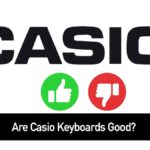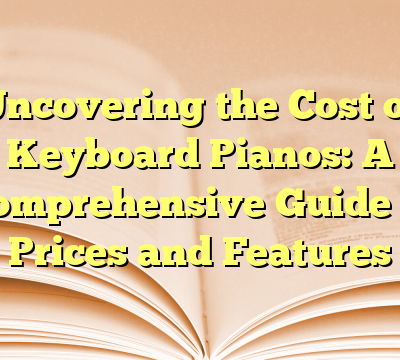If you're thinking about learning to play the piano, you might be wondering if starting on a keyboard is a good idea. I've been there, and I can tell you it's not only possible, but it also has some benefits that may surprise you.
In this article, we'll explore why a keyboard can be a great alternative to a traditional piano for beginners. We'll dive into the advantages of learning on a keyboard, from cost and convenience to versatility and volume control.
So if you're ready to tickle those ivories but don't have the space or budget for a grand piano, stick around. You might find that a keyboard is the perfect fit for your musical journey.
The Benefits of Learning on a Keyboard
As we tread deep into musical waters, a frequently asked question strikes a chord: why play the keyboard instead of a traditional piano? Isn't a piano superior? Well, it's time to shed light on the popular belief that pianos are unquestionably superior to keyboards. Truthfully, the keyboard holds its own appeal, proffering some overlooked advantages.
Versatility is the standout in this mix. Unlike the traditional piano, a keyboard introduces you to a world of sounds from various instruments. It doesn't adhere solely to acoustic piano sounds, casting a wider net covering strings, percussion, brass, and more. It's like owning an orchestra at your fingertips.
Meanwhile, the volume control a keyboard provides is an often underestimated advantage, perfect for those dwelling in apartments or shared living spaces. There's also the handy headphone option, allowing you to get lost in music without disturbing others.
Let's not forego the cost and convenience factors either. A keyboard is significantly more portable and affordable than a piano. It requires minimal space, is easily transported, and you won't need to break your wallet. It makes the idea of learning to play a musical instrument seem a lot less daunting.
In terms of learning, keyboards equipped with light-up keys can guide your fingers to the correct notes, simplifying the learning process. Some models even offer built-in learning systems!
So, don't be dissuaded from picking up a keyboard due to pressure from the piano camp. The keyboard not only opens up a multitude of opportunities but also provides an enjoyable way to delve into the world of music.
Cost and Convenience
Let's cut to the chase: keyboards are simply more affordable than traditional pianos. You could find a decent keyboard for a few hundred dollars whereas a decent acoustic piano often starts at a few thousand. In fact, the cost difference is so significant that many beginners or even intermediate learners opt for keyboards before investing in a pianos.
| Keyboard | Piano | |
|---|---|---|
| Average price | $100-$500 | $2000-$8000 |
When it comes to convenience, keyboards win the fight hands down. They're lightweight, portable, and don't require the same kind of maintenance as traditional pianos. If you're living in an apartment or sharing your space with others, practicing on a keyboard is a blessing. Good luck trying to move a traditional piano up three flights of stairs!
Keyboards also provide more variety and flexibility. With a keyboard, you may use a different voice setting for every song you play. That's like having an entire orchestra at your fingertips. Plus, most keyboards let you adjust the volume, an option that just isn't available with traditional pianos. You can wear headphones and play your heart out without disturbing your neighbors.
Besides affordability and convenience, many keyboards come with additional tools that help with learning and practicing. Some have light-up keys to guide learners, some have built-in metronomes for practice, and some even have the ability to record and playback your performances. These features make the whole process of learning and practicing more engaging and fun.
In short, if you're looking for a more affordable, convenient, and versatile option to embark on your musical journey, you can't go wrong with a keyboard.
Versatility
One of the key advantages of using a keyboard over a traditional piano is its Versatility. Here's why.
Various Instrument Sounds
With keyboards, you're not limited to just the sound of piano keys. Instead, keyboards enable you to experiment with a wide array of instrument sounds. We're talking vibrant trumpets, wailing guitars, thundering drums, and even serene flutes. Essentially, a keyboard provides an entire orchestra at your fingertips. This diverse sound palate opens up a wealth of opportunities for creativity.
Light-up Keys and Built-In Metronomes
These are not mere gimmicks. They're effective learning tools designed to aid beginners. Light-up keys guide users on which notes to hit, perfect for those initial stages of learning. Built-in metronomes, on the other hand, help maintain a consistent rhythm.
Volume Control
Another key benefit of keyboards relates to volume control. Traditional pianos produce a lot of sound which can lead to noise complaints, especially in close quarters. Keyboards solve this problem with their adjustable volume control. Plus, for those wanting to practice in silence, keyboards often come with headphone jacks.
| Feature | Benefit |
|---|---|
| Various Instrument Sounds | Expands creative possibilities |
| Light-up Keys & Built-In Metronomes | Aids beginners in learning |
| Volume Control | Controllable noise level |
Studying the piano on a keyboard thus offers countless possibilities. Whether you wish to explore different sounds, learn effectively with the help of modern tools, or manage your noise level - a keyboard can handle it all.
By choosing a keyboard over a traditional piano, you're not replacing one with the other. Rather, you're opting for a more versatile instrument that also happens to be more affordable, portable, and user-friendly. Who wouldn't want that in their repertoire?
Volume Control
One of the most underrated, yet highly essential features that keyboards boast over traditional pianos is the Volume Control. Think about a piano, it's loud and proud – an iconic instrument indeed. But the volume? It's set in stone once the piano hammers hit the strings. You can't turn it down. It can be a real issue, especially if you're living in shared places like apartments or dormitories. However, with a keyboard, the scenario takes quite a drastic turn.
Unlike pianos, keyboards offer excellent volume flexibility. Whether you need to tone it down during an early morning practice session or want to crank it up for a late-night jam, the decision is yours. Keyboards are equipped with a volume slider or knob, which is a handy feature that lets you adjust the sound level to your convenience. If you’re a parent with a child who is just starting out, I bet you’ll appreciate the value of this control. Trust me, it saves a lot of headaches, or more accurately, earaches!
Not just the overall volume of the music, but the volume of individual keys can also be controlled on a keyboard. It gives you an added advantage to create more nuanced and dynamic performances. You can play softly for more delicate pieces or hammer out a melody without causing a disturbance.
Let's look at some numbers. Imagine you're playing a piano at full sound potential. The decibel level can go up to 100 dB, that's similar to the noise level of a motorcycle or an orchestra. A keyboard, on the other hand, can be set to the sound level of a quiet conversation or can be pushed up to mimic the intensity of a concert performance if you wish so. To put it into perspective, check out this comparison below:
| Instrument | Sound Level (in dB) |
|---|---|
| Piano | Up to 100 dB |
| Keyboard | Adjustable (25-100 dB) |
These details clearly highlight the versatility and usability of keyboards in various settings. Exercising control over your musical instrument’s volume is not just about maintaining peace with your neighbors. It's empowering, offering a whole new layer to your playing experience and overall musical journey. So, do think about it while choosing your instrument.
Conclusion
So, it's clear that keyboards have a lot to offer. They're affordable, versatile, and convenient, making them a great alternative to traditional pianos. The volume control feature stands out, offering a level of flexibility that you just don't get with a piano. This allows you to adjust the noise level to your liking, making keyboards a suitable choice for any setting. Whether you're a beginner or a seasoned musician, the keyboard's wide array of sounds and built-in features can enhance your musical journey. So why not give it a try? You may find that a keyboard is just the instrument you need to unleash your creativity and enjoy music to the fullest.
Harlan Kilstein began playing piano during covid with no piano background at all. He taught himself how to play learning what to do and what not to do.
Today he's an advanced intermediate player and can help you grow in your skills because he learned all this on his own.







